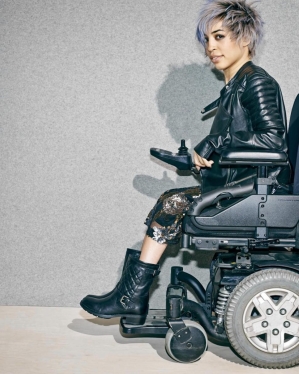In a heartwarming move, Nordstrom clothing company continues to feature models with disabilities in its latest catalog.
Since 1997, the Seattle-based company has used models with different kinds of physical handicaps in its catalog. Their July 2014 issue, which offers discounts and previews for fall fashions, continues the trend, reports Fox News.

Those featured include a woman in a wheelchair modeling boots and a man with a prosthetic leg modeling Nike running shoes. The models are not at all photoshopped, as the model wearing Nikes has one on his foot and the other on his prosthetic device. The model wearing boots in shown sitting in a wheelchair wearing a punk-inspired outfit, complete with a leather jacket and spiked hair.
Nordstrom's use of disabled models is relatively unheard of in the fashion industry.
"Identifying companies that utilize models or actresses with disabilities has been like finding a needle in a haystack," said Meg O'Connell, a partner at the consulting firm Global Disability Inclusion.
The company, she added, "is a leader in this space and has been a long-standing supporter of disability inclusion not only in their advertising but also in employment and accessibility in their stores."
Nordstrom spokeswoman Tara Darrow, a spokesperson for Nordstrom, said using the models is "really about reflecting the customers and communities we serve. We serve diverse customers and it's an opportunity for them to see themselves when they're looking through the book or online. ... We don't promote it or go out and talk about it. We just think they look great."
O'Connell commented that many retail industries may be at a "tipping point" in terms of including models with disabilities, as H&M and Diesel have also recently featured models with disabilities, while Swiffer recently featured an amputee actor and a Duracell ad used a deaf football player.
Earlier this year, designer Carrie Hammer made national headlines when she featured only disabled models when revealing her line at New York Fashion Week. The motto behind the collection, Hammer revealed, was, "Role models, not runway models." Her historic decision sparked a national debate about the fashion industry's unrealistic beauty standards.
"I think it's very important for the spectrum of fashion designers (low- to high-end designers) to recognize their consumers with disabilities, and I don't think that any designer really does a good job at that," said Danielle Sheypuk, who modeled Hammer's designs while in a wheelchair.
According to O'Connell, people with disabilities represent a significant marketing opportunity, with $225 billion in discretionary spending, and "companies that understand this will have an advantage."
Sheypuk agrees, noting that designers would be wise to focus on consumers with disabilities.
"We are essentially never pitched to, and virtually ignored when it comes to fashion... people with disabilities are consumers of fashion - which is exactly why more designers should have the foresight that [Hammer] had and incorporate models with disabilities," she concluded.







